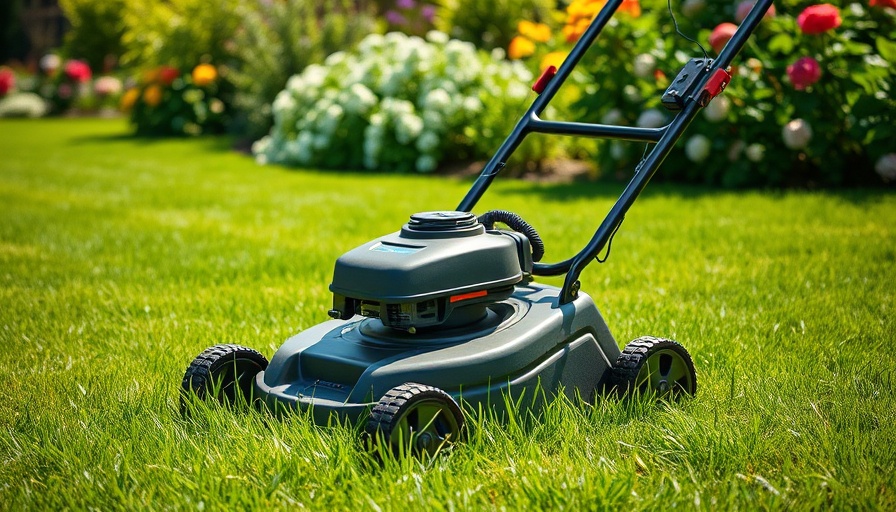
The Rise of Propane-Powered Lawn Mowers
In recent years, propane-powered lawn mowers have seen a surge in popularity as homeowners and landscapers alike shift towards sustainable practices. As economic pressures mount and environmental concerns take center stage, many individuals are reassessing their choices in lawn care equipment. By evaluating both propane and traditional gas-powered mowers, you can make informed decisions that align with your values and lifestyle.
Cost-Effectiveness: A Closer Look
The fluctuating price of gasoline can strain budgets, particularly for those in the landscaping profession or homeowners with vast yards. According to the U.S. Energy Information Administration, propane prices generally hover around $2.69 per gallon compared to gasoline, which can be about $3.29. This translates to an immediate 22.3% savings. Given that propane mowers experience less gas spillage and contamination, it's likely that overall savings could be even greater in the long run.
Moreover, engine longevity is an important factor to consider. Gasoline engines can accumulate carbon deposits, leading to potential repairs and maintenance costs. In contrast, propane-powered mowers require less upkeep, meaning homeowners and property managers can focus on maintaining their lawns rather than worrying excessively about engine maintenance.
Safety: Breathe Easy with Propane
Safety is a top priority for all homeowners, especially when dealing with fuels. Propane stands out due to its high octane rating and reduced toxicity. Unlike gasoline, which poses risks of spills and groundwater contamination, propane’s gaseous form eliminates these hazards, making it not just safer to use but also environmentally friendly.
Additionally, propane produces fewer harmful emissions, contributing to cleaner air during lawn care. This aspect is vital not only for personal health but also for the health of the community, particularly in densely populated neighborhoods. The operation of propane mowers is also quieter, reducing noise pollution, and creating a more pleasant mowing experience for homeowners.
Eco-Friendliness: Enhancing Sustainable Living
For those engaged in sustainable landscaping, propane mowers align well with eco-friendly initiatives. Using a cleaner fuel source allows property owners to maintain their outdoor spaces without contributing to air pollution. This practice resonates with consumers increasingly interested in environmentally responsible choices.
Moreover, homeowners can complement their use of propane mowers with other sustainable practices such as planting indigenous flora or utilizing permeable paving on their driveways. This holistic approach to landscaping maximizes the ecological benefits while enhancing the aesthetic appeal of their properties.
Practical Insights: Making the Transition
When considering a transition from a gas-powered to a propane-powered lawn mower, gather insights on various models available in the market. Researching local propane suppliers can also facilitate a smoother shift to propane-dependent equipment.
Furthermore, if you are unsure about the investment, renting or testing a propane mower can help you gauge its performance and usability for specific lawn care needs, especially in seasonally intense climates like Michigan.
Informed Decisions: Maximizing Your Lawn Care Experience
With a myriad of options available, homeowners and small commercial property owners must weigh their priorities when it comes to lawn maintenance. Are you looking to maintain a lush, beautiful yard, engage in eco-friendly behavior, or save some money on fuel? Understanding these elements is critical in enhancing both the efficiency of your lawn care efforts and the sustainability of your approach.
As a strong advocate for sustainable living, consider the benefits propane mowers can provide. They not only help in reducing your carbon footprint but also foster a greener lifestyle while ensuring your lawn looks immaculate. Thus, making the shift might be not only a wise financial decision but an investment in your health and environment.
Call to Action
Explore options for propane lawn mowers in your area and consider how this transition can positively impact your lawn care routine. By making informed choices, you can enhance both your outdoor spaces and your overall environmental footprint. Discover more about sustainable practices and products today!
 Add Row
Add Row 
 Add
Add 


 Add Row
Add Row  Add
Add 
Write A Comment